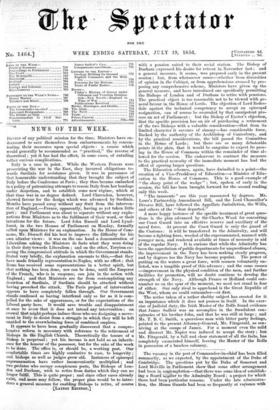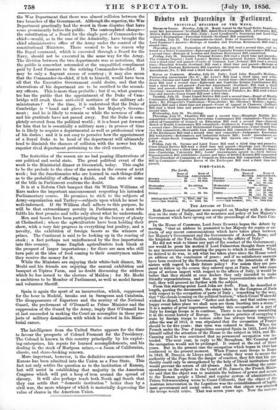The vacancy in the post of Commander-in-chief has been filled.
summarily, as we expected, by the appointment of the Duke of Cambridge. The questions put by the Duke of Somerset and Lord Melville in Parliament show that some other arrangement had been in contemplation—that there was some idea of establish- ing a Board h...4.11ar to the Admiralty Board; a project for which. there had been.particular reasons. Under, the late administra- tion, the House Guards had been so freqnently at vatiance with the War Department that there was almost collision between the two branches of -the Government. Although the superior, the War Department practically had the worst in those disputes that have come prominently before the public. The contemplated change— the substitution of a Board for the single post of Commander-in- chief—would, as in the ease of the Admiralty, have brought the chief administrative office of the Army under the control of the constitutional Ministers There seemed to be no reason why the Royal command, which is executed through a Board for the Navy, should not be executed in the same way for the Army. The division between the two, departments was so notorious, that the public is somewhat astounded at the unqualified compliment paid by Lord Panmure to the retiring Commander-in-chief. It May be only a flagrant excess of courtesy; it may also mean that the Commander-in-chief, if left to himself, would have been all that the Executive Government could desire, and that the aberrations of his department are to be ascribed to the second- ary officers. This is more than probable ; but if so, what guaran- tee has the public that the appointment of the Duke of Cam- bridge will crush these anti-civil mutinies of the military ad- ministrators? For the time, it is understood that the Duke of Cambridge is "hand and glove" with her Majesty's Govern- ment; and he is likely to remain so while the newness of office and his gratitude have not passed away. But the Duke is com- pletely severed from the political world ; it is a boast put forward for him that he is essentially a military man ; in process of time he is likely to acquire a departmental as well as professional view of his duties ; and it is not easy to perceive how the appointment of a Royal Duke to be head of the department will ultimately tend to diminish the chances of collision with the newer but the superior rival department pertaining to the civil executive.



























 Previous page
Previous page